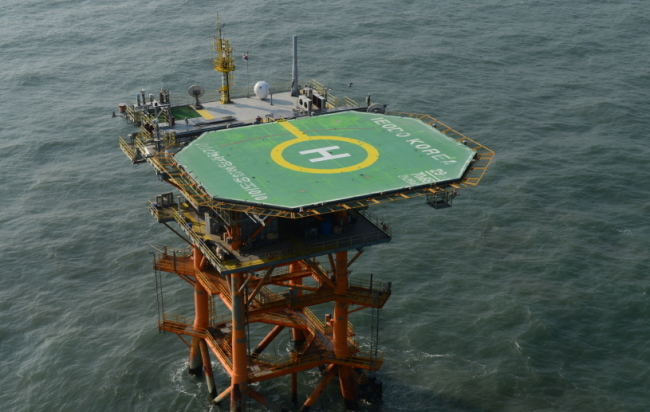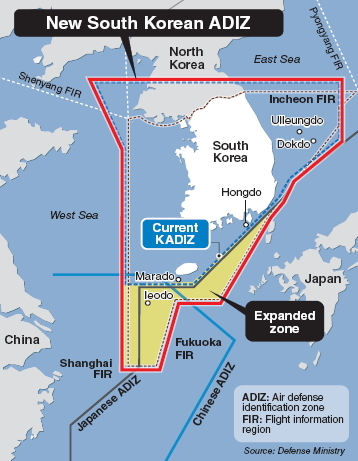Korea’s air defense zone expanded to Ieodo, Hongdo
By Shin Hyon-heePublished : Dec. 8, 2013 - 20:11

South Korea on Sunday announced the first expansion of its air defense identification zone in 62 years in a tit-for-tat against China’s recent airspace declaration that fueled fresh tension in Northeast Asia.
Seoul’s new zone stretches further south to include its submerged rock of Ieodo and areas south of the two islands of Marado and Hongdo, effective as of Dec. 15, Defense Ministry spokesperson Kim Min-seok said. The areas overlap with those of China and Japan.
Beijing’s ADIZ in East China Sea unveiled on Nov. 23 drew protests from Korea, Japan and the U.S. as it includes spaces over the South Korea-controlled Ieodo as well as a chain of islands controlled by Japan and claimed by China.
“The adjustment is in line with the global aviation order and international norms, includes no restrictions on the operation of civilian aircraft, and does not infringe upon the territorial airspace and relevant interests of neighboring countries,” Kim said in a news conference.
Until the expansion, South Korea’s ADIZ, demarcated by the U.S. in 1951 during the Korean War, does not cover Ieodo. The country has been operating a scientific research facility on the reef since 2003.

Located south of Jejudo Island and 4.6 meters below sea level, Ieodo has often been a source of contention between Seoul and Beijing as it lies in the intersection of the two countries’ exclusive economic zones.
Their 14 rounds of talks between 1996 and 2008 to delimit the boundary made little progress. South Korea has recently proposed reopening negotiations by year-end.
The ministry said the government informed neighboring countries of its decision in advance. President Park Geun-hye also discussed the issue during her talks with U.S. Vice President Joe Biden last week in Seoul.
The countries “in general concurred that our adjustment accords with international norms and is not excessive,” said Jang Hyuk, director general for policy planning at the ministry.
He said Seoul’s control over Ieodo has “nothing to do” with the expanded KADIZ.
“With an accidental military clash being a matter of our top consideration, we will continue to hold consultations with our neighbors,” Jang said.
“There could be differences between nations on such a policy issue. But we believe our announcement will not have a big impact on relations with China and Japan and they also share our view.”
U.S. State Department spokeswoman Jen Psaki said Seoul’s approach was pursued in a “responsible, deliberate fashion” through prior consultations with its neighbors.
Their opposition to China’s demarcation was in part because it was declared unilaterally and requires, not recommends or requests, any foreign civilian and military airplanes flying over the area to identify themselves and report their entry in advance.
“We also appreciate the Republic of Korea’s commitment to implement this adjustment to its ADIZ in a manner consistent with international practice and respect for the freedom of overflight and other internationally lawful uses of international airspace,” Psaki said in a statement.
“This approach avoids confusion for, or threats to, civilian airlines.”
By Shin Hyon-hee (heeshin@heraldcorp.com)



![[Herald Interview] 'Amid aging population, Korea to invite more young professionals from overseas'](http://res.heraldm.com/phpwas/restmb_idxmake.php?idx=644&simg=/content/image/2024/04/24/20240424050844_0.jpg&u=20240424200058)







![[Hello India] Hyundai Motor vows to boost 'clean mobility' in India](http://res.heraldm.com/phpwas/restmb_idxmake.php?idx=644&simg=/content/image/2024/04/25/20240425050672_0.jpg&u=)






![[Today’s K-pop] NewJeans' single teasers release amid intrigue](http://res.heraldm.com/phpwas/restmb_idxmake.php?idx=642&simg=/content/image/2024/04/26/20240426050575_0.jpg&u=)